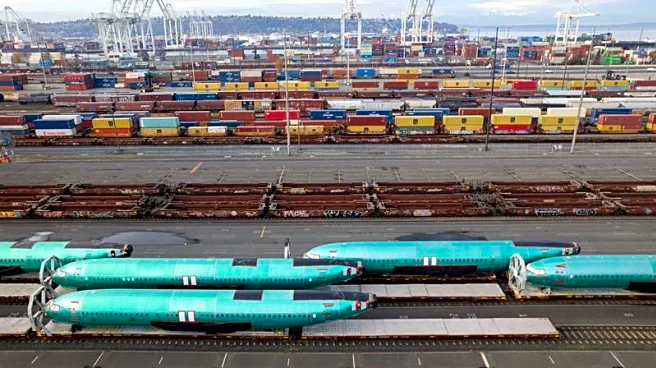What's Happening?
PlasCred Circular Innovations Inc., a clean technology company based in Alberta, has announced its acceptance into the Business Coalition for a Global Plastics Treaty. This coalition, convened by the Ellen
MacArthur Foundation and WWF, includes over 300 businesses, investors, and NGOs committed to addressing plastic pollution through a global agreement. The coalition aims to tackle plastic pollution across its lifecycle and includes major multinational companies such as Coca-Cola, Nestlé, Unilever, and Walmart. PlasCred's involvement signifies its commitment to harmonized global regulations and advancing circular solutions that keep plastics in the economy and out of the environment. The company plans to contribute technical insights and engage in policy discussions to support scalable, circular solutions.
Why It's Important?
The inclusion of PlasCred Circular Innovations in the Business Coalition for a Global Plastics Treaty highlights the growing momentum towards addressing plastic pollution on a global scale. By joining forces with influential companies and organizations, PlasCred aims to drive systemic policy changes that support economically viable circular economy infrastructure. This coalition's efforts could lead to significant advancements in plastic recycling technologies and policies, potentially reducing environmental impact and promoting sustainable practices. The coalition's focus on extended producer responsibility and traceability could also influence industry standards and regulatory frameworks, benefiting both the environment and businesses committed to sustainability.
What's Next?
As part of the coalition, PlasCred will participate in dialogues on policy design that supports extended producer responsibility and investment in circular infrastructure. The company aims to inform treaty provisions that enable innovation and deliver measurable environmental outcomes. The coalition's efforts are expected to culminate in a UN treaty that aligns with circular economy principles, potentially transforming how plastics are managed globally. Stakeholders, including businesses and governments, may need to adapt to new regulations and invest in technologies that support circular solutions.
Beyond the Headlines
The coalition's work could have broader implications for global trade and environmental policies. By advocating for harmonized regulations, the coalition may influence international standards and practices, potentially leading to more cohesive global efforts to combat plastic pollution. This could also drive innovation in recycling technologies and create new market opportunities for companies specializing in sustainable solutions.











